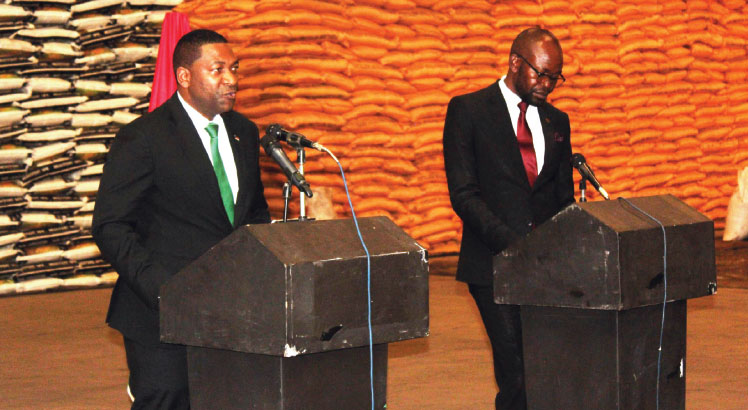AIP problems far from over
Problems rocking the implementation of the Affordable Inputs Programme (AIP) are far from over with the country facing a deficit of 25 000 metric tonnes (MT), an equivalent of 500 000 bags of fertiliser.
In a related development, the Office of the Ombudsman has faulted this season’s AIP which it says has been marred with “critical challenges” and has since given implementing authorities 14 days to respond.

Speaking to journalists during a press conference in Mzenga, Nkhata Bay yesterday, Minister of Agriculture Sam Kawale conceded that the situation on the ground will force his ministry to miss a second deadline of December 26.
The ministry already missed a 40-day implementation deadline President Lazarus Chakwera set during the launch of the programme on October 20.
Kawale, who spoke on general agriculture issues in the country, could not tell when the remaining fertiliser will be sourced.
To date, he said, at least 77 percent of the 1.5 million beneficiaries have accessed the inputs, mostly NPK fertiliser while many are yet to access Urea.
Said Kawale:”As of Wednesday night, about 77 percent of beneficiaries had accessed fertiliser across the country and majority had accessed NPK while a significant number have accessed both NPK and Urea. We will continue to distribute until every eligible person redeems.
“We did not move as fast as we expected. We remain with a deficit of 25 000MT and once we get that, it will take us to 100 percent. About 12 000MT of these will come from Farmers World, Optichem, and Malawi Fertiliser Group. We have agreed with them and have started uplifting the inputs.”
Besides, he said they are also about to get the remaining 6 000MT fertiliser from International Fund for Agricultural Development (Ifad). He added that the ministry was still engaging the Reserve Bank of Malawi (RBM) to pay for the remaining 25 000MT.
Said Kawale: “The RBM can better respond on when money could be available to pay suppliers. But I have been assured by the RBM Governor that money has started coming into the country, they expect about $80 million, but that will not just go towards fertiliser. It’s up to them on how much to allocate us.”
At Mpamba selling point, Senior Chief Timbiri said the challenge has been delays in dispatching the inputs, especially NPK.
“We have had more of Urea, yet people require NPK first. We are not sure that we have NPK today because the minister is here. People are getting NPK when maize in some fields is already grown,” he said.
However, Parliamentary Committee on Agriculture chairperson Sameer Suleman wondered why the Ministry of Agriculture continues to play with people that are already facing hunger.
He said even the 77 percent redemption rate the minister highlighted was not correct, saying the inputs were yet to reach many parts of the country.
Said Suleman: “It is high time the minister must learn the truth. It seems officials are not telling him the truth. Parliament approved that budget in April, they assured us that we will get fertiliser in July but we are now at the end of December. They have failed us and need to be fired”
O n i r r e g u l a r i t i e s regarding AIP, Kawale said police are handling 15 cases involving 20 people while the Anti-Corruption Bureau (ACB) is handling 60 cases on the same.
RBM spokesperson Mark Lungu said the central bank is trying its best to allocate resources, but the basket remains thin.
He said: “We are very thin on forex now. But we are working hand in hand with commercial banks, such that if we have been given an invoice, we discuss, and see how best we help each other.
“But you can imagine that even within essential commodities, there is competition for forex. We know the need, that without fertiliser we are going to create another problem, so we are trying to do our best.”
Earlier, Civil Society Agriculture Network b o a r d cha i r p e r s on Herbert Chagona was also pessimistic about the government meeting the December target, saying the ministry failed to reach half of the beneficiaries in 40 days.
He said the ministry should have procured fertiliser early as the national budget was passed early to accommodate such key procurements.
In February this year, Chakwera promised a timely AIP and directed that procurement processes should be done by end June 2023 so that people start accessing inputs early July 2023.
Meanwhile, the Office of the Ombudsman has written the Secretary for Agriculture and Smallholder Farmers Fertiliser Revolving Fund of Malawi (SFFRFM) chief executive officer (CEO) giving an update on spot checks her office has conducted on AIP.
In a letter The Nation has seen, Ombudsman Grace Malera said her office conducted the checks in 26 of the country’s 28 districts in December 2023 as part of its ongoing ‘systematic’ investigations into the AIP acting on complaints.
Office of the Ombudsman principal public relations officer Mandy Pondani, in an interview yesterday, confirmed that the office had addressed the two authorities and was optimistic the 14- day ultimatum would be adhered to.
In its findings, the Office of the Ombudsman said the challenges rocking AIP included some farmers failing to buy inputs because the system showed they had already redeemed their inputs while they had not, slow restocking of inputs and unreliable network.
The ombudsman has also faulted the government for failing to pay fertiliser suppliers in time which it says has been contributing to shortage of the commodity on the market.
Reads the letter: “In the course of spot-checks, the Office of the Ombudsman has registered critical challenges that are hampering the effective implementation of AIP.
“The challenges require the immediate intervention by both the Ministry of Agriculture and SFFRFM as the key institutions in the implementation of the AIP.”
The ombudsman further said beneficiaries without national identification cards but with National Registration Bureau forms were being denied access to buy the inputs, and that there was also slow restocking of Urea fertiliser in almost all districts.
Efforts to talk to Secretary for Agriculture Dickxie Kampani yesterday proved futile as his phone was busy the whole afternoon, and when we tried to speak to the ministry’s spokesperson Geoffrey Banda, he referred us back to Kampani.
Similarly, SFFRFM CEO Richard Chikunkhuzeni did not respond to our calls, but responded through a message asking to be called later.
Section 124 of the Constitution gives power to the Ombudsman to require the immediate release of information and production of documents of any kind from a public body or officer.
Chakwera launched the 2023/24 AIP programme in Kasungu on October 20 2023 when he said it was his government’s wish for every household to achieve food security.
The AIP has faced implementation challenges over the years, with the Donor Committee on Agriculture and Food Security in Malawi urging the government to rethink the allocations to the AIP which consume over half of the funding to the sector.





